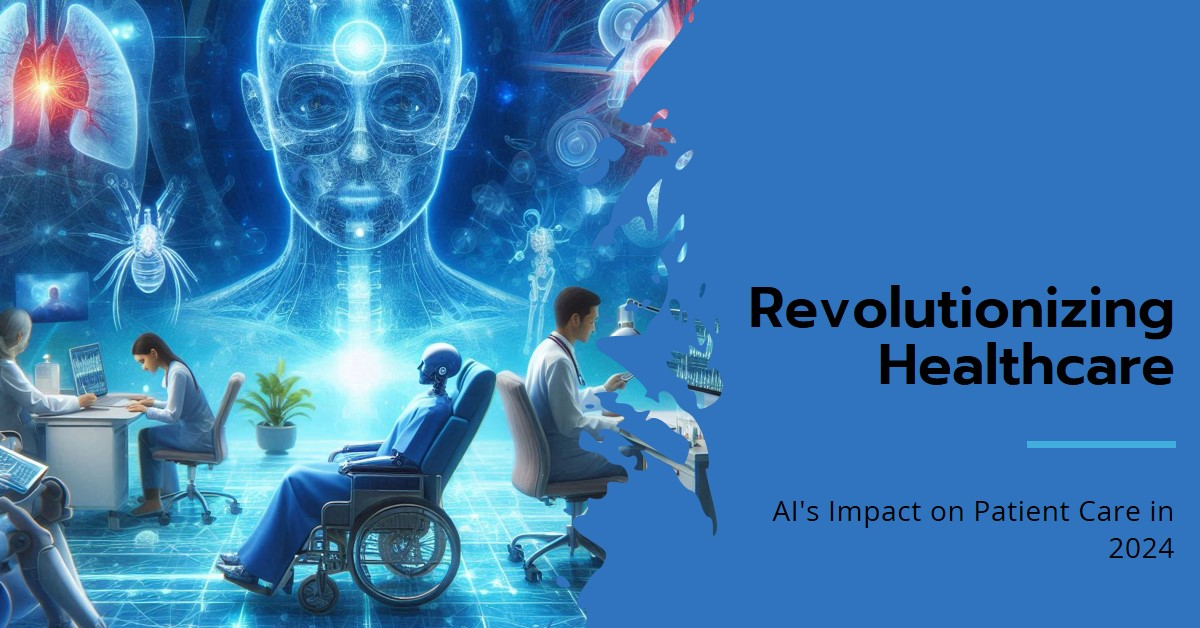Artificial Intelligence (AI) is rapidly transforming various sectors, and healthcare is no exception. In 2024, AI in Healthcare is poised to revolutionize patient care by enhancing diagnostics, personalizing medicine, and streamlining healthcare management. With new applications emerging daily, the integration of AI into healthcare systems is not just a trend but a pivotal shift that promises to improve patient outcomes, reduce costs, and increase the efficiency of healthcare delivery.
AI-Driven Innovations in Diagnostics
One of the most impactful areas where AI is making strides is in diagnostics. Traditionally, diagnosing diseases has been a complex and time-consuming process, often reliant on the expertise and judgment of healthcare professionals. However, AI is changing the landscape by enabling faster, more accurate diagnoses.
- Medical Imaging and Radiology: AI-powered algorithms are being used to analyze medical images, such as X-rays, MRIs, and CT scans, with remarkable accuracy. These AI systems can detect anomalies, such as tumors or fractures, that might be missed by the human eye. For instance, Google Health’s AI model has shown promise in detecting breast cancer in mammograms with greater accuracy than radiologists.
- Early Disease Detection: AI is also playing a crucial role in the early detection of diseases. For example, AI algorithms can analyze vast amounts of genetic data to identify individuals at risk for conditions like Alzheimer’s or heart disease long before symptoms appear. This allows for early intervention and better management of these diseases, potentially saving lives.
- Pathology: In pathology, AI is being used to analyze tissue samples for signs of cancer and other diseases. These AI-driven systems can process and analyze samples much faster than human pathologists, providing quicker results for patients.
For more on how AI is revolutionizing diagnostics, visit Epic Infinite.
Personalized Medicine: Tailoring Treatment to Individual Patients
AI is also driving the shift towards personalized medicine, where treatments are tailored to the individual characteristics of each patient. This approach contrasts with the traditional “one-size-fits-all” method, which often overlooks the unique genetic makeup and lifestyle factors of patients.
- Genomics and Precision Medicine: AI is being used to analyze genetic data to develop personalized treatment plans. For instance, AI can identify specific gene mutations that may make a patient more or less responsive to certain treatments. This information allows healthcare providers to prescribe medications and therapies that are most likely to be effective for that individual.
- AI in Drug Development: AI is speeding up the drug development process by predicting how patients will respond to new drugs based on their genetic profiles. This not only shortens the time it takes to bring new treatments to market but also reduces the cost of drug development.
- Chronic Disease Management: AI is helping to manage chronic diseases like diabetes and hypertension by analyzing data from wearable devices and electronic health records (EHRs). These AI systems can predict disease flare-ups and recommend personalized interventions, such as changes in diet or medication, to prevent complications.
Explore how personalized medicine is evolving in Epic Infinite.
Healthcare Management: Enhancing Efficiency and Reducing Costs
Beyond diagnostics and personalized medicine, AI is revolutionizing healthcare management by improving operational efficiency and reducing costs. As healthcare systems become more complex, AI provides tools that help manage these challenges effectively.
- Predictive Analytics: AI is being used to predict patient admission rates, optimize staffing levels, and manage hospital resources. For example, AI can analyze data from past flu seasons to predict the demand for hospital beds and supplies, ensuring that resources are allocated efficiently.
- Virtual Health Assistants: AI-powered virtual assistants are being used to manage routine tasks, such as scheduling appointments, answering patient queries, and providing medication reminders. These assistants help reduce the workload on healthcare staff, allowing them to focus on more critical tasks.
- AI in Telemedicine: The COVID-19 pandemic accelerated the adoption of telemedicine, and AI is enhancing this by providing real-time insights during virtual consultations. AI-driven tools can analyze patient data in real-time, offering doctors valuable insights that help in making informed decisions.
For insights into how AI is improving healthcare management, check out Epic Infinite.
Challenges and Ethical Considerations
While AI holds tremendous potential, it also presents challenges and ethical considerations. Issues such as data privacy, the potential for algorithmic bias, and the need for robust regulatory frameworks must be addressed to ensure that AI is used responsibly in healthcare.
- Data Privacy: Protecting patient data is paramount, and AI systems must comply with stringent data protection regulations to ensure that sensitive information is not misused.
- Algorithmic Bias: AI algorithms must be trained on diverse datasets to avoid biases that could lead to disparities in healthcare outcomes.
- Regulation and Oversight: As AI becomes more integrated into healthcare, there is a need for clear regulations to govern its use. This includes ensuring that AI systems are transparent, explainable, and accountable.
Conclusion: The Future of AI in Healthcare
As we move further into 2024, AI will continue to play an increasingly central role in healthcare, driving innovations that enhance patient care, improve efficiency, and reduce costs. By addressing the challenges and ethical considerations, AI can revolutionize healthcare in ways that benefit patients, healthcare providers, and society as a whole.
For more articles on how AI is transforming industries, visit Epic Infinite.
Internal Links:
- Discover the impact of AI in various industries on Epic Infinite.
- Learn about the latest trends in healthcare technology on Epic Infinite.
External Links:
- For a comprehensive overview of AI in healthcare, visit World Health Organization.
- To explore cutting-edge research on AI in medicine, check out Nature Medicine.
By staying at the forefront of AI-driven innovations, healthcare providers can deliver more accurate, personalized, and efficient care, ultimately improving patient outcomes and revolutionizing the healthcare industry.










